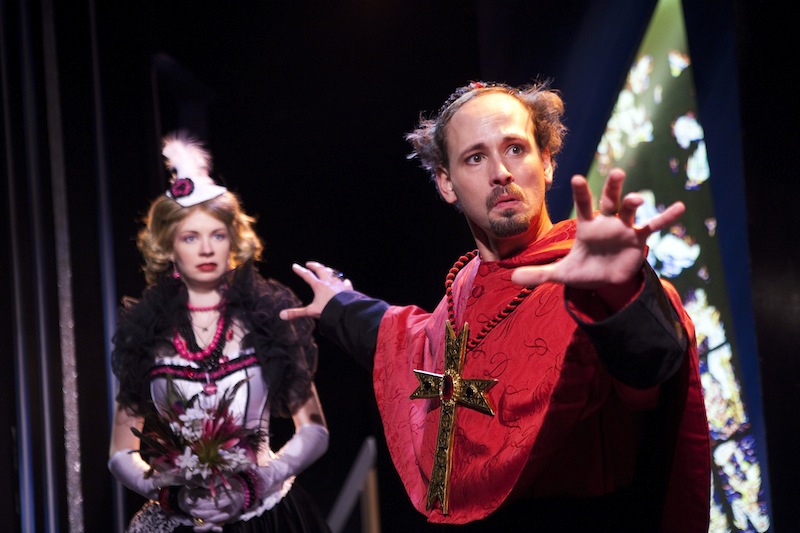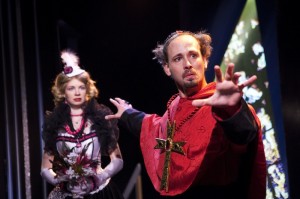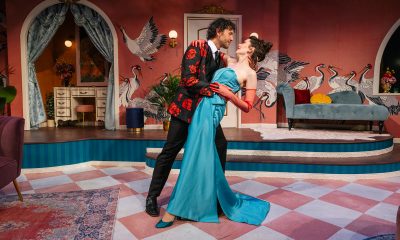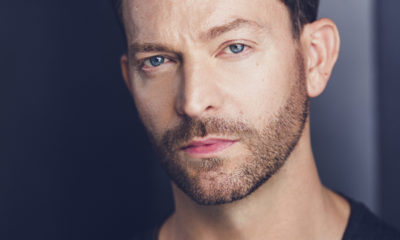Theater
‘Women’s’ wily ways
Current Constellation production breathes goth life into centuries-old work

‘Women Beware Women’
Through Nov. 14
Constellation Theatre Company
Source Theatre, 1835 14th Street, N.W.
$25-$30
1-800-494-8497

Caley Milliken, left, and gay actor Ashley Ivey in Constellation's current production 'Women Beware Women,' which plays through Nov. 14. (Photo by Daniel Schwartz; courtesy of Constellation)
Constellation Theatre’s lively production of Thomas Middleton’s Jacobean tragedy “Women Beware Women” is a hardcore lesson in the ways of the world.
“Want is the way to whoredom,” says Livia, a well-heeled cougar, to her much younger and poorer quarry Leantio. The icy noblewoman’s money for love approach is straightforward and — more importantly in this world of vice and power — successful.
Livia is the same woman who facilitates an incestuous relationship between her brother and their niece, and arranges for the Duke of Florence to snatch away a young, sequestered bride. It’s all in a day’s work for this busy lady.
Written in 1621, Middleton’s wickedly enjoyable tale of bad behavior and revenge is based on an even older Italian story about a Venetian heiress who elopes with a lower class boy to cosmopolitan Florence where the young newlyweds are sucked into a maelstrom of lust and sin.
For this production, the company’s artistic director Allison Arkell Stockman has moved the action to a more indeterminate time and place. The look of the show – inspired by movie director Tim Burton — is like a dark fairy tale. The slightly sinister set (designed and evocatively lit by A.J. Guban) is a blue-walled funhouse. Kendra Rai’s costumes are goth-meets-“Moulin Rouge.” Fun and fanciful, they add to the general demented storybook effect. (I’d like to see the scheming Livia styled as a Chanel-clad, chignon-sporting social X-ray rather than a white- haired, senior can can dancer, but that’s for another production.)
Constellation, a consistently ambitious company, takes on Jesse Burger’s 2003 streamlined adaptation of Middleton’s almost four-centuries-old, over-the-top tragedy in verse with relish and enthusiasm, proving that classic theater can be very much alive and full of surprises. The evening’s highlights include intimate two-character exchanges dealing with seduction, betrayal and jealousy — here Stockman’s staging is at its best. In one particularly effective scene, a newly suited and booted Leantio (an appropriately callow Thomas Keegan) slips into the posh new digs of his estranged young wife Bianca (the excellent Caley Milliken) where under the cover of shadowy darkness, they engage in passionate embraces before getting down to more serious matters like discussing her affair with the Duke and Leantio’s showing Bianca an effusive love letter from his recently acquired sugar mama.
The ensemble cast is solid. Standouts include Sheila Hennessey as the calculating Livia and Katy Carkuff as Livia’s gullible, sexually charged niece, Isabella. Lisa Lias plays Lianto’s feisty mother who resembles a better-dressed Granny Clampett. Audiences last saw Brian Hemmingsen as an intimidating Lady Bracknell in SCENA’s production of “The Importance of Being Earnest.” Here he plays the macho and manipulative Duke of Florence. Gay actor Ashley Ivey dons robes and skullcap to play the Duke’s equally power-conscious brother, Lord Cardinal. Keith Irby makes the most of his part as the meddling guardian to a rich young heir.
With the notable exception of the highly entertaining masque (the play’s finale in which almost all the players marvelously meet their fates), some of the show’s group scenes seem a little awkward and the play’s comedic instances can feel a tad forced. Fortunately, at the odd moment when things sag or lag, gay composer Jesse Terrill’s terrific original music – alternately pleasantly melodic and eerie – infuses the Constellation’s production with energy and helps to move things along while nicely adding to the show’s overall fractured fairytale atmosphere.

‘A Wrinkle in Time’
Through July 20
Arena Stage
1101 Sixth St., S.W.
Tickets range from $59-$209
Arenastage.org
Currently at Arena Stage, talented out actor and singer Taylor Iman Jones is rekindling an old friendship with an adored character of fiction.
Broadway vet Jones is starring as 13-year-old Meg Murry in “A Wrinkle in Time,” the world-premiere musical adaptation of Madeleine L’Engle’s same-titled book.
For many readers, especially women, the classic 1962 young adult novel, was their first foray into sci-fi, particularly one with a female protagonist.
The story centers on Meg, an awkward schoolgirl whose physicist father has mysteriously disappeared. Now, Meg, her popular friend Calvin, and smart younger brother Charles Wallace are tasked with moving through time and space to find him. Along the way they encounter adventure and evil.
For Jones, 33, playing 13-year-old Meg feels freeing in ways. She says, “As you get older, you’re told to grow up, so I like letting go of some of that. To feel feelings in their rawest form and to tap back into that is fun. I like the spontaneity. There are highs and lows to revisit.”
Born and raised in the San Francisco Bay Area, Jones began piano lessons at just six and soon added band and plays to their pursuits. Following high school, she made a deep dive into California theater for seven years before making the big move to New York in 2017 where after just two months she was singing on Broadway.
The determined and appealing Jones, who lives in New York with their partner, boasts an impressive bio. She has appeared on Broadway as Catherine Parr, Henry VIII’s sixth and final wife in Six, and in the original casts of “Head Over Heels” and “Groundhog Day.” She’s been seen in national tours of “Hamilton” and “American Idiot.”
WASHINGTON BLADE: It seems “A Wrinkle in Time” and Meg mean a lot to a lot of people.
TAYLOR IMAN JONES: The book tells the story of a girl with so much undiscovered power who’s accomplishing things she never imagined that she could.
BLADE: Can you relate?
JONES: Meg wears her emotions on her sleeve. I can certainly relate to that. I’m a Pisces. Sometimes being hyperemotional and very empathetic can feel like a burden, but as I’ve matured, I have realized that it’s not a bad quality. And it’s something I’ve learned to harness and to enjoy. I love that I can play a role like Meg in front of thousands of people.
BLADE: Was “Wrinkle in Time” a book you knew well?
JONES: Oh yeah, it’s a favorite book that lives in my heart and my mind. It’s one of the first books that taught me about the adventure of reading.
BLADE: And playing a favorite character must be a kick.
JONES: It really is.
BLADE: Meg is a big part in a big show.
JONES: This musical is huge. They’re traveling through space and meeting people on different planets. 20-person cast. 30 songs in the show. Quite the undertaking and I’m proud of us. I’m on stage for the entire musical and I sing four or five numbers.
As a mezzo soprano I guess you’d say I have the luxury of being able to do a lot of musicals that span a lot of different genres: rock musical, pop musical, and standards. “A Wrinkle in Time” is contemporary musical theater.
For me, singing is probably the least difficult part of the show. What’s harder for me is the way Meg experiences trauma; I need to be careful when I’m screaming and yelling.
BLADE: It seems mostly women have been involved in making this production happen (book by Lauren Yee; music and lyrics by Heather Christian; directed by Lee Sunday Evans; and choreography by Ani Taj.)
JONES: It’s true, the director, writer, etc., and most of our producers are all women. This doesn’t happen most of the time. For me it means new ideas and fresh energy, and pushing the limits of musical theater.
It’s also created a wonderful space in which to work. It can be more generous, and understanding. And centering the story on a young girl is something we can all relate to.
BLADE: Will “A Wrinkle in Time” resonate with queer theatergoers and their families?
JONES: I think so, especially on the heels of pride month. It’s truly a show for all ages about finding your inner strength and fighting for the things that you love; not letting evil win over the power of good, and not just for yourself but for those around you too.
Theater
‘Andy Warhol in Iran’ a charming look at intersection of art, politics
Mosaic production plumbs kidnapping plot of iconic artist for humor

‘Andy Warhol in Iran’
Through July 6
Mosaic Theater Company at Atlas Performing Arts Center
1333 H St., N.E., WDC
$70
Mosaictheater.org
Behind the blasé veneer, Andy Warhol was more curious than people knew. Particularly when it came to money. He kept a close eye on how the ultra-rich lived, what fellow artists were being paid and who was paying them, and, of course, all the new and more saleable ways of making and selling art.
In playwright Brent Askari’s “Andy Warhol in Iran,” now playing at Mosaic Theater Company, Warhol (Alex Mills) is brought outside of his usual area of interest when he lands face to face with a young revolutionary. While Warhol could be artistically revolutionary, he didn’t connect with the idea of forgoing the pursuit of money and fame for the infinitely more difficult task of achieving social justice.
The 90-minute play is not fully factual, but rather inspired by Warhol’s real life 1976 trip to Tehran to make portraits of the royal Pahlavi family in the waning days of their reign, with a focus on Farah Diba, the Shah’s elegant wife and Iran’s last empress.
The action unfolds in a Tehran hotel suite boasting a glorious view of the snowcapped Alborz Mountains not far from Iran’s vibrant and bustling capital. It’s here, disguised as room service, that Farhad (played by Nathan Mohebbi) gains entrance to Warhol’s rooms, seeking to kidnap the pop art star to garner attention for the university students’ movement.
Warhol meets the armed intruder with a sort of wide-eyed wonderment, flummoxed why he has been selected for abduction. Warhol can’t understand why a young man like Farhad wouldn’t prefer to be paid a big ransom on the spot, or be cast as a star in one of the Warhol Factory flicks.
When Farhad replies it’s because Warhol is the most decadent artist in the world, Warhol mistakenly takes it for the ultimate compliment. After all, his biggest successes had been connected to celebrity and consumerism (think Campbell’s Soup Cans. 1962).
For Warhol, decadence is aspirational. He made portraits of financiers, movie stars, and jet setters. In fact, he’d been obsessed with the lives of the rich and famous since he was a small kid in Pittsburgh thumbing through Photoplay Magazine while bed bound with Saint Vitus Dance.
Accompanying Warhol to Tehran (unseen) are his business manager Fred Hughes, and Bob Colacello, editor of Interview magazine. Together, they make a merry trio of gay social climbers. These kinds of trips were a boon to the artist. Not only did they solidify a new strata of high society contacts, but were also superbly lucrative, thickly padding the painter’s pockets.
While in Iran, Warhol wanted only to view Farah’s vast world-class collection of jewels, sample the caviar on tap, and get his Polaroids. Then he’d fly first class back to New York and transfer the images to silk screen and sell the portraits to the Persian royals at a hefty price. He didn’t foresee any obstacles along the way.
Serge Seiden’s direction is spot on. He’s rendered a wonderfully even two-hander with a pair of terrifically cast actors. And Seiden plumbs the piece for humor mostly drawn from the absurdity of the situation without missing any of the serious bits.
As Warhol, out actor Mills is instantly recognizable as the eccentric artist. He’s wearing the button-down shirt, jeans, blazer, glasses, and, of course the famed shock of white hair wig (here a little more Karen than Andy). His portrayal is better than an imitation. He gives a bit of the fey and confused, but has also infuses him with a certain dynamism.
The energy works well with the intensity of Mohebbi’s would-be kidnapper Farhad. And while it isn’t a romance, it’s not impossible to think that Warhol might fall for a handsome male captor.
The connection between art and politics is almost always interesting; and though not a super deep dive into the era or the life of an artist, “Andy Warhol in Iran” is a compelling, charming, and sometimes funny glimpse into that intersection.
Theater
‘Hunter S. Thompson’ an unlikely but rewarding choice for musical theater
‘Speaks volumes about how sad things land on our country’

‘The Untitled Unauthorized Hunter S. Thompson Musical’
Through July 13
Signature Theatre
4200 Campbell Ave., Arlington, Va.
$47 to $98
Sigtheatre.org
The raucous world of the counterculture journalist may not seem the obvious choice for musical theater, but the positive buzz surrounding Signature Theatre’s production of Joe Iconis’s “The Untitled Unauthorized Hunter S. Thompson Musical” suggests otherwise.
As the titular, drug addled and gun-toting writer, Eric William Morris memorably moves toward his character’s suicide in 2005 at 67. He’s accompanied by an ensemble cast playing multiple roles including out actor George Salazar as Thompson’s sidekick Oscar “Zeta” Acosta, a bigger than life Mexican American attorney, author, and activist in the Chicano Movement who follows closely behind.
Salazar performs a show-stopping number — “The Song of the Brown Buffalo,” a rowdy and unforgettable musical dive into a man’s psyche.
“Playing the part of Oscar, I’m living my Dom daddy activist dreams. For years, I was cast as the best friend with a heart of gold. Quite differently, here, I’m tasked with embodying all the toxic masculinity of the late ‘60s, and a rampant homophobia, almost folded into the culture.”
He continues, “My sexuality aside, I like to think that Oscar would be thrilled by my interpretation of him in that song.
“Our upbringings are similar. I’m mixed race – Filipino and Ecuadorian and we grew up similarly,” says Salazar, 39. “He didn’t fit in as white or Mexican American, and fell somewhere in the middle. Playing Oscar [who also at 39 in 1974 forever disappeared in Mexico], I pulled out a lot of experience about having to code switch before finally finding myself and being confident just doing my own thing.
“As we meet Oscar in the show we find exactly where’s he’s at. Take me or leave me, I couldn’t care less.”
In 2011, just three years after earning his BFA in musical theater from the University of Florida in Gainesville, Salazar fortuitously met Iconis at a bar in New York. The pair became fast friends and collaborators: “This is our third production,” says George. “So, when Joe comes to me with an idea, there hasn’t been a moment that I don’t trust him.”
In “Be More Chill,” one of Iconis’s earlier works, Salazar originated the role of Michael Mell, a part that he counts as one of the greatest joys of artistic life.
With the character, a loyal and caring friend who isn’t explicitly queer but appeals to queer audiences, Salazar developed a fervent following. And for an actor who didn’t come out to his father until he was 30, being in a place to support the community, especially younger queer people, has proved incredibly special.
“When you hear Hunter and Oscar, you might think ‘dude musical,’ but I encourage all people to come see it.” Salazar continues, “Queer audiences should give the show a shot. As a musical, it’s entertaining, funny, serious, affecting, and beautiful. As a gay man stepping into this show, it’s so hetero and I wasn’t sure what to do. So, I took it upon myself that any of the multiple characters I play outside of Oscar, were going to be queer.
Queer friends have seen it and love it, says Salazar. His friend, Tony Award-winning director Sam Pinkleton (“Oh, Mary!”) saw Hunter S. Thompson at the La Jolla Playhouse during its run in California, and said it was the best musical he’d seen in a very long time.
“Since the work’s inception almost 10 years ago, I was the first Oscar to read the script. In the interim, the characters’ relationships have grown but otherwise there have been no major changes. Still, it feels more impactful in different ways: It’s exciting to come here to do the show especially since Hunter S. Thompson was very political.”
Salazar, who lives in Los Angeles with his partner, a criminal justice reporter for The Guardian, is enjoying his time here in D.C. “In a time when there are so many bans – books, drag queens, and travel — all I see is division. This is an escape from that.”
He describes the Hunter Thompson musical as Iconis’s masterpiece, adding that it’s the performance that he’s most proud of to date and that feels there a lot of maturity in the work.
“In the play, Thompson talks to Nixon about being a crook and a liar,” says Salazar. “The work speaks volumes about how sad things land on our country: We seem to take them one step forward and two steps back; the performance is almost art as protest.”
-

 Federal Government2 days ago
Federal Government2 days agoTreasury Department has a gay secretary but LGBTQ staff are under siege
-

 Virginia3 days ago
Virginia3 days agoDefying trends, new LGBTQ center opens in rural Winchester, Va.
-

 District of Columbia2 days ago
District of Columbia2 days agoGay GOP group hosts Ernst, 3 House members — all of whom oppose Equality Act
-

 District of Columbia2 days ago
District of Columbia2 days agoD.C. police seek public’s help in July 5 murder of trans woman












